If geological history is to believed, the earth was a much less divided place eons ago. About 200 to 300 million years ago, the continents were, to put it not very scientifically, smushed together. The massive, pre-split “supercontinent” is known as Pangea.
For Jason McCue, an indie singer/songwriter whose sonic approach goes well beyond those genre labels, Pangea is a concept that serves as a framework for his upcoming album of the same name, out March 9.
From the Philadelphia suburb of West Chester, where he grew up listening to artists ranging from Queen to Modest Mouse, to Seattle, where he is now a college senior, you might say McCue has experienced shifts of continental proportions in his music. We recently chatted via email with him about his musical and personal background and the process and concept behind the new album.
Tell me about the writing process for “Pangaea.”
Writing PANGAEA was my project for the summer. The school year had let out, I had just started an internship with an environmental research group, and I found myself with a whole lot of free time to plan out this project that I had been thinking about making for a while. It started with a bunch of little melodies and chord progressions that I knew had a chance to come together in a significant way, and once there was a road map to build the album, the lyrics all came in. Most of the writing actually happened during the recording process, though. Before the laptop came out, most tracks were a bare-bones frame of what I wanted the record to be. And once I was able to establish a few central themes for it all, it became way easier to make the words.
Are there particular songs that kind of set out your path for the album in a thematic sense? If so, how?
Yeah, I’d say so. The beginning of the album is super harsh, lyrically. It’s supposed to depict a state of malevolence or resentment for another thing just because of its existence in general, and that tension builds. In particular, “When He Drinks and I Want to Hold Him” bring out that venom right from the start. A central point of the album is that constant and constricting forces have the ability to break what has always seemed solid, so I wanted the first few songs to be constricting for that reason.
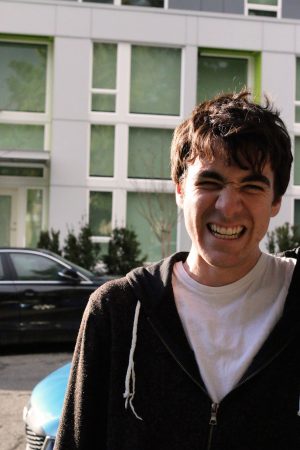 How does the concept of Pangaea speak to you? Is it a metaphor for something more personal?
How does the concept of Pangaea speak to you? Is it a metaphor for something more personal?
It’s the idea of splitting up, and breaking something that might have been thought to be unbreakable. It’s one of those “Even Rome has fallen” testaments to the delicacy of the strong things. It’s supposed to reflect a time in Earth’s history when all life got cleansed by a crazy extinction, which wiped out like 94 percent of all species. There’s a vision in the project that Pangaea is acting as a messed-up sort-of Garden of Eden for those things that were fit enough to make it through the conditions that caused the extinction, and basically restart life to shape it from there. And the final thought of the album is that since the continents are all moving away from each other, and since the Earth is a sphere, that might mean they’ll crash again, initiating another cleansing event.
These aren’t your typical, “strummy” singer/songwriter tunes. Did you envision the instrumentation, effects, etc. right off the bat, or did those elements get fleshed out later?
I had a vague idea of where I wanted each song to ultimately end up, but how I got there really determined the finished product more than anything else. Making a song is usually half writing the melody, chords, lyrics, etc., and half trying to record it, using either the effects on my computer or some of my roommates’ instruments lying around or just my voice. Recording is what I do for fun, so I always like to see what new stuff I can have come from the process.
Tell me a bit about the recording process. Sort of following up on the previous question, did you do a lot of overdubs to include the various instruments and embellishments?
I recorded it all at home, usually in my bedroom. I have one of those USB microphones that plugs right in. That’s how I get all of the instruments down.
Yeah, I do a ton of double-tracking. It sounds really empty if I don’t, so I usually do multiple tracks of the guitars, vocal lines, and even the drums sometimes, and I go to town panning it all to different ears.
Looking back on your previous releases, how do you feel that you’ve developed as a writer and musician?
I think I’ve grown up while making PANGAEA. I feel like I’m more able to draw on personal feelings to create something now than I’ve been before. Because of that, PANGAEA feels more real. Like, I’m incredibly proud of what I’ve put out in the past, but this one tells a story in a way I’ve never been able to before. As far as the content itself, writing the songs forced me to look at a lot of things I pushed away for a while. It makes for better songs, but the vulnerability that comes with it definitely makes me nervous.
As a singer, did it take time to develop your voice, phrasing, etc.? Is it something that had to be honed and tweaked?
It’s funny, I actually went into singing while kicking and screaming. I really didn’t like it; I had no idea how to control where my voice was going. Hah, I still don’t.
I guess the hardest thing I had to do with it was figure out how to make myself not sound like… what you think I’d sound like. Hahah, I don’t know, I’m definitely a dude with an acoustic guitar, and there are a whole lot of dudes with acoustic guitars, but I wanted to differentiate my voice a little from the rest of the club.
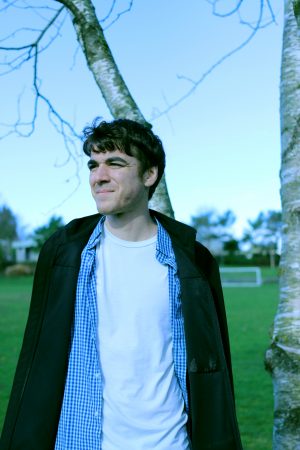 What type of approach do you take to your live performances? Are there particular artists you’ve seen live that helped influence that approach?
What type of approach do you take to your live performances? Are there particular artists you’ve seen live that helped influence that approach?
I have to plan out my live performances with a ton of detail. Without a band or beat or anything, so much of my show’s success is dependent on its environment. Like, a packed house party is not ideal, but a small living room filled with indie kids sitting on the floor is where it goes best. I also try to make sure that the people there are constantly being engaged. The downfall of people’s shows in my genre I think is having a bunch of songs sound similar, going one right after the other. So, I focus on the setlist a lot. I don’t know, I just try to imagine what Freddie Mercury would do if he was an unknown indie folk artist.
What will you be doing to promote the album? Any particular shows, videos or sessions you’d like to mention?
Yes! I’m holding the release party at Washington Hall in Seattle on March 9. It’ll be presented by KEXP, and feature my friends Falon Sierra and Tomo Nakayama. Both insanely beautiful songwriters.
I’ll be live on 107.7 The End on Sunday March 4! I’m really excited for that, it’s such a historic station that put Seattle on the world’s music map. Being there will be special.
Tell me a bit about your upbringing in West Chester. What did you listen to growing up? Were you old enough to go to shows in the Philly area before you moved?
West Chester’s a great little town, and I had a nice little childhood. Loving parents, a supportive older brother, fun friends, Little League, it was all nice. You’d definitely see a picture of my childhood house next to the dictionary definition of suburbia, which was good for age 0 through 14 I think, but once I hit 15, it started to feel a little bit like I was Luke Skywalker on Tatooine.
In middle school I listened to a lot of The Beatles, and a lot of power-ballad heavy jock-rock bands. But then by high school, I found out about acts like Jeff Buckley and Queen and Modest Mouse. Philly had a ton of awesome house shows and DIY venues, which didn’t usually make younger kids bounce, so I was able to delve into that culture a lot, and being there for those shows was really incredible. And if I really wanted to go to a club show in the city, my dad sometimes came and took one for the team.
When and why did you move to Seattle?
I moved when I was 19 — I had been going to Drexel University in Philly for a year, but then I transferred to Seattle University. I knew I wanted to go to school for environmental studies, and the school itself combined with the surrounding area was a pretty optimal location. It was kind of a weird transition at first. I didn’t know anyone, and it was tough saying goodbye to my friends, family, girlfriend at the time, and everything else. But, it turned out to be one of the best moves I’ve made, I couldn’t be happier with the life I’ve constructed for myself out here.
How would you describe the current state of the Seattle music scene, from your viewpoint and experiences?
You know, the Seattle music scene turned out to be way more supportive than I ever imagined it being. There are a ton of people, venues, organizations, and even important industry workers who genuinely want to see young artists succeed and make their art. I think for as long as people keep throwing DIY shows and events, and for as long as people keep ensuring their circles in the music scene are inclusive, respectful and supportive of everyone involved, Seattle’s music scene will continue to thrive.
Do the grunge years of the ’90s still loom large there?
It actually all turned into polka. Never woulda guessed it, but all the grunge people dropped their flannels and picked up their trumpets. I’m into it; Macklemore’s shown support.
As a listener, how did you consume music growing up? Vinyl/CD/digital? How did you discover new music?
My parents got me an iPod for Christmas when I was like, 11 I think? I remember being stoked on the ability to listen to Green Day’s “American Idiot”… right after listening to AC/DC/’s “Back in Black”… without even changing a CD or anything. It was pretty magical. After that, it was all digital, iTunes, MP3s, etc. I use Spotify and YouTube now for the most part. As for as getting the word on new music that’s coming out, I get a lot of great suggestions from my friends on what bands I should be listening to.
Speaking broadly, what do you hope to accomplish in your musical career?
I just want to have a lot of fun. I have no clue what this record will amount to, where I’ll be able to go in the near future, or anything else, so I want to make sure I’m enjoying this time in my life when I’m able to put out my art, and perform when I want to.
Are there any other projects or collaborations that you would like to mention?
Hmm, well I’m working on my Senior Capstone Project right now for school. It’s the project I need to turn in or else I’m not graduating in June! It’s pretty cool actually, I’m looking at the effectiveness of wildlife corridors to see whether or not their worth putting funding into.
Lead photo by Brady Harvey. Other photos by Haley Ford.

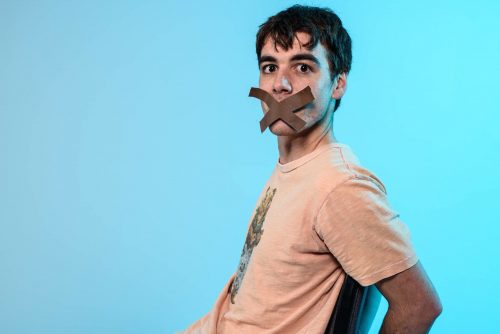
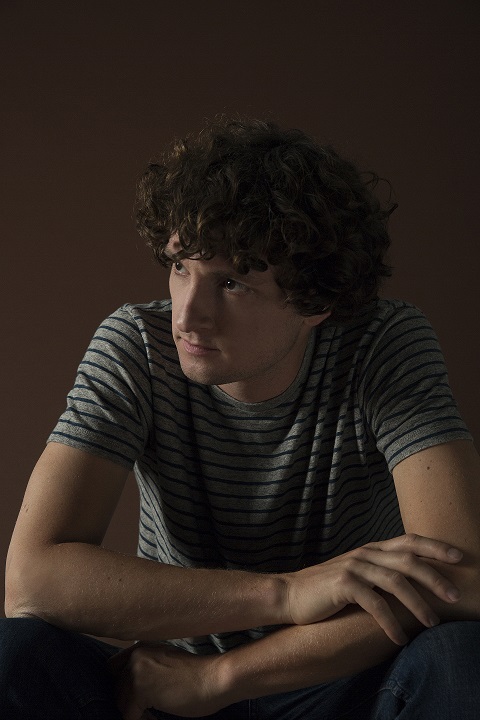
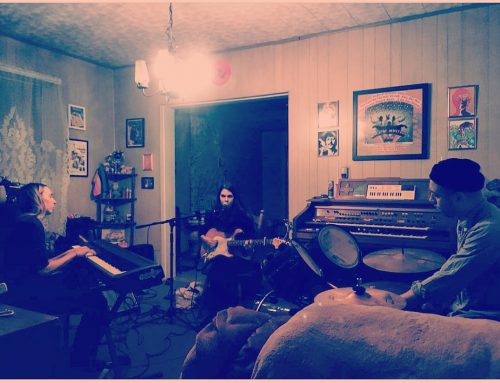
Thanks, Kate— thee made my day!